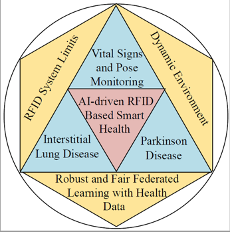
Many existing health monitoring systems are expensive, uncomfortable to wear, or can only be administered in a hospital environment. With advances on the Internet of Things (IoT), Machine Learning (ML), and Artificial Intelligence (AI), it is highly desirable to develop AI-driven radio frequency sensing techniques to make smart health monitoring cheaper, more comfortable to use, and more accessible to the broad population while supporting excellent monitoring performance. Dr. Xuyu Wang is doing just that through a recent NSF grant for Smart Health and Biomedical Research in the Era of Artificial Intelligence and Advanced Data Science. Dr. Wang’s project will develop Radio Frequency Identification (RFID) based sensing systems for smart health monitoring.
Dr. Wang will be working in conjunction with researchers from Auburn University, Rhode Island Hospital, and John Hopkins University, all of whom were listed as collaborative partners on the grant. The project is part of the NSF’s SCH program Smart Health and Biomedical Research in the Era of Artificial Intelligence and Advanced Data Science), the purpose of which is “to support the development of transformative high-risk, high-reward advances in computer and informational science, engineering, mathematics, statistics, behavioral and/or cognitive research to address pressing questions in the biomedical and public health communities.” Each of the four collaborating partners will receive $300,000 over the four-year research project for a total $1.2 million project.
The project’s full abstract states, “Many existing health monitoring systems are expensive, uncomfortable to wear, or can only be administered in a hospital environment. With advances in the Internet of Things (IoT) and Machine learning (ML)/artificial intelligence (AI), it is highly desirable to develop AI-driven radio frequency sensing techniques to make smart health monitoring cheaper, more comfortable to use, and more accessible to the broad population while supporting excellent monitoring performance. This project develops Radio Frequency Identification (RFID) based sensing systems for smart health monitoring. Specifically, several fundamental problems will be investigated, and novel ML/AI techniques will be developed for RFID sensing-based smart health applications. This project leverages passive RFID tags as wearable sensors for monitoring human health conditions to help diagnose diseases such as Parkinson’s and interstitial lung disease. ML/AI-driven methods, such as tensor decomposition, transfer learning (via domain adaptation and meta-learning), deep Gaussian Processes, and federated learning will be incorporated to develop effective solutions to these challenging problems.”
The full abstract can be found at https://www.nsf.gov/awardsearch/showAward?AWD_ID=2306791
